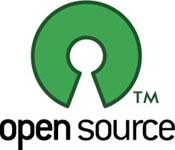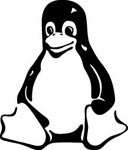



February’s General Meeting was held at Northern Virginia Community College in Annandale and was titled “The Joy of Open Source!” The usual question and answer session started the event with some good questions that tried to stump Pi President John Barnes. The first one generated a considerable discussion on capturing digital video. Other questions followed which also generated many remarks and comments that proved to be enlightening, at least me. Pat Fauquet then spoke about February’s CD-ROM which contained much of the open source software that was presented at the meeting. We ended with the raffle and some nice stuff found its way into member’s eager hands.
So what is open source software? It is free for the taking; what else do you need to know! Well, our presenter -- Pi member Mike Mellor -- quantified the matter by pointing out there are two types of software in this category: free and open source software, which are opposed to each other. Free software was started as a concept that anything intellectual should be free to share, free to use and free to expand upon. Open source is a little more pragmatic with its founding premise: “I will give you the source, but it is mine.” Then, there is shareware, which is software put out for use by others but it may contain a “Nag Screen” that solicits donation or payment. These differences may seem subtle, but they play a prominent role within the Linux community, many members of which are violently opposed to paying for anything - no matter how good it is! And within this whole spectrum, there is the huge Mac user group community that has a long history of freeware and shareware, and is now playing a major role in the open source movement as well. Using this as a point of departure, Mike then showed us free or inexpensive applications developed for the Mac.
The pros and cons of dealing with free software were first addressed. Mike pointed out that besides being free or cheap ($10 -20 price range), a lot of free software is cross platform with much of it derived from Linux programs and then ported over to the Mac for use with Mac OS X. Many of these programs are also good because there are frequent updates.
On the con side, things aren’t always as polished as we have become accustomed to with offering from Apple and other big name developers. Interfaces may be a little quirky because the developer is not following the Apple user guidelines. Updates can be few and far between.
The meat of Mike’s presentation focused on two main themes: alternative and unique software. Three alternative examples were discussed, the first being two packages intended as 100% replacements for Microsoft (MS) Office. These were OpenOffice and NeoOffice, the latter of which is Java based. Mike went through a briefing on NeoOffice with comparisons of various programs within NeoOffice to its arch nemesis - MS Office. Mike’s overall assessment was OpenOffice looks “kinda Unix like” while NeoOffice appears more like a Mac in its menu system. He demonstrated both packages while answering inquiries.
Next, GIMP was compared to Photoshop Elements and the demonstration revealed its ease of use and impressive output. Mike quickly created an iPod ad, showing us it was in some ways more powerful than the commercial Photoshop Elements.
The third example highlighted the similarities of Mozilla’s Camino and Apple’s Safari. Mike prefers Camino for its simplicity and speed. He pointed out that Camino is much like Firefox: it is a pure Web browser, except Camino is for the Mac only while Firefox has versions for virtually every platform.
In the next section of “unique” applications, Mike covered a text editor application called TextWrangler; Fink; which allows you to recompile Linux applications on a Mac; and the VideoLAN Client (VLC), which is a video player program. TextWrangler, written by the same company that created the acclaimed commercial text editor BBEdit, is a powerful text-editing alternative to Apple’s TextEdit, and is derived from work done on BSD Unix editors.
Two other programs Mike mentioned dealt with the iPod and playing games. PlayPod is a Podcast aggregator application. Mike related how he depends on PlayPod to load up his iPod with his favorite podcasts. Then listening to these helps ease the pain of a 45-minute commute each day. And where does one find information and podcasts to download? The web site PodCast Alley is considered the focal point for podcasting.
On the fun side, Big Bang Chess is a great chess game offered by Freeverse software. It is an outstanding demonstration of Mac technologies.
Mike went on to talk about and demonstrate some other open source programs. The first was a utility called QuickSilver. It is a simple application that allows you, with just a few keystrokes, to access any application, folder or file on your hard drive. It operates very much like the application LaunchBar, but with the emphasis on keyboard control. Press the Command key and spacebar at the same time, then start typing the first few letters of the title or item name, and up pops a listing possible choices. This little utility is very handy.
To help direct us to where these and other applications can be found and downloaded, a complete list of software links was provided. They were also placed on the monthly CD. The links are as follows:
Overall, Mike did a great job of introducing and then expanding on this interesting and educational topic. It was very encouraging knowing that there are free or inexpensive, highly capable alternative software titles out there for Mac users.
John Barnes took the last few minutes of the meeting to highlight some upcoming Pi events. First, there was the March General Meeting’s agenda and location, which was to be a change to our regular location. We were told the meeting would highlight two local software developers and it would be held in Bethesda. Part of the rationale was to make it easier for our Maryland members to attend. Next he addressed the issue of the upcoming election. He pointed out we had until midnight of the March general meeting to submit nominations for five Board of Director positions. Finally, another reminded was voiced regarding submissions to the Pi Journal. John stated that everyone is welcome to submit articles and to send them to editor@wap.org.
Door prizes were then given out and even those that didn’t have a winning number did walk out armed with a better understanding of open source software possibilities.
An outline of the meeting program is available in PDF format (1.55 MB), created in an Open Source alternative to PowerPoint.


